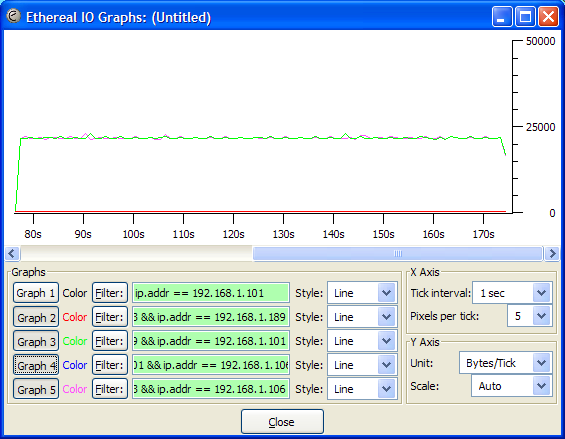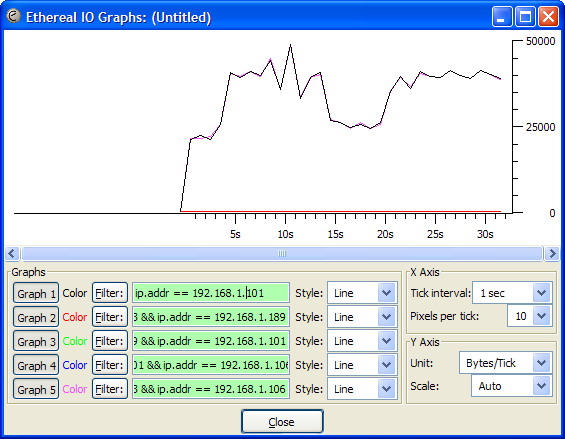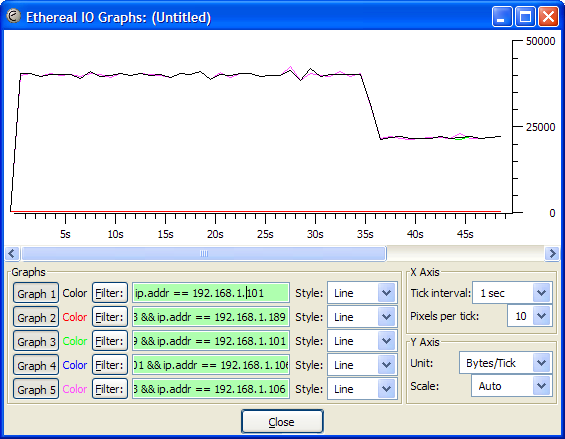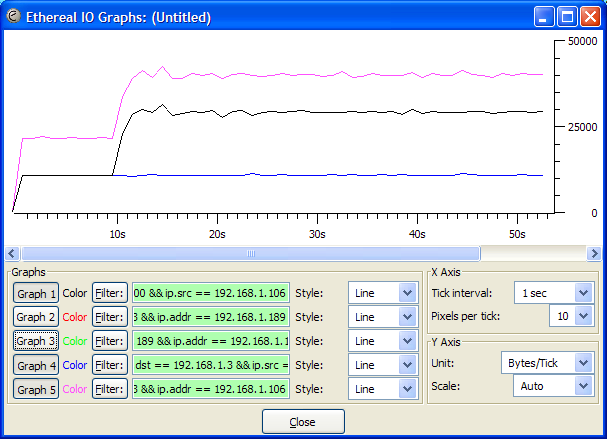Difference between revisions of "Ethereal/Wireshark Analysis"
| Line 48: | Line 48: | ||
# Asterisk PBX | # Asterisk PBX | ||
| − | [[image:ethereal_graph_difference_voice and video.png]] | + | [[image:ethereal_graph_difference_voice and video.png|Ethereal graph showing the differences in traffic between audio and video (resp. g711u and H263-1998 codec)]] |
Legenda: | Legenda: | ||
| − | * Black shows audio & video from SIP-phone #1 to the PBX (video starting at the 10<sup>th</sup> second) | + | * '''Black''' shows audio & video from ''SIP-phone #1'' to the PBX (video starting at the 10<sup>th</sup> second) |
| − | * Blue shows audio-only from SIP-phone #2 to the PBX | + | * '''Blue''' shows audio-only from ''SIP-phone #2'' to the PBX |
| − | * Pink shows all traffic between SIP-phone #1 and the PBX (both directions) | + | * '''Pink''' shows all traffic between ''SIP-phone #1'' and the PBX (both directions) |
| − | The debug-screen [[image:X-lite debug-info.png|right|157px]] of X-lite (Ctrl + F9) told us the SIP-phone assumed a total available bandwith of 256/256 kbps. | + | The debug-screen [[image:X-lite debug-info.png|right|157px|X-lite debug-screen]] of X-lite (Ctrl + F9) told us the SIP-phone assumed a total available bandwith of 256/256 kbps. |
This was filled with 64 kbps for speech (protocol g711u) and 131 kbps for video (protocol H263-1998) | This was filled with 64 kbps for speech (protocol g711u) and 131 kbps for video (protocol H263-1998) | ||
Revision as of 19:11, 30 January 2007
Voice only analysis
The following screenshot shows network-traffic (in Bytes/s) for the following connections:
- Black: traffic from and to Trixbox #1
- Red: traffic between the 2 Windows machines running X-lite
- Green: traffic between laptop #1 and its Asterisk
- Blue: traffic between the two Asterisk PBX's
- Pink: traffic between Windows machine #1 and its Asterisk
From the graph shown above there can be concluded that indeed the two X-Lite machines are only connected to their own Trixbox, i.e. there is no direct traffic between the two X-Lite machines.
Voice and video analysis
Schematic sketch of the situation:
In the screenshot below, the following events were measured:
- @4 sec: Video was turned on
- @14 sec: Video was set to black (connection lost with DVdriver)
- @20 sec: Video showed moving pictures again.
Legenda:
- Black: traffic from and to Trixbox #1
- Red: traffic between the 2 Windows machines running X-lite
- Green: traffic between laptop #1 and its Asterisk
- Blue: traffic between the two Asterisk PBX's
- Pink: traffic between Windows machine #1 and its Asterisk
The following graph shows the traffic is almost constant. Till 35sec the conversation included audio and video. The rest is audio-only.
This measurement shows there is no traffic between both SIP-phones, only via (both) Asterisk PBX.
Differences between voice and video
For this test, we connected 2 SIP phones to the same Asterisk PBX. We meassured the bandwitdh used between the following 3 points:
- SIP-phone #1 with camera
- SIP-phone #2 without camera
- Asterisk PBX
Legenda:
- Black shows audio & video from SIP-phone #1 to the PBX (video starting at the 10th second)
- Blue shows audio-only from SIP-phone #2 to the PBX
- Pink shows all traffic between SIP-phone #1 and the PBX (both directions)
The debug-screen
of X-lite (Ctrl + F9) told us the SIP-phone assumed a total available bandwith of 256/256 kbps.
This was filled with 64 kbps for speech (protocol g711u) and 131 kbps for video (protocol H263-1998)
When looking at the speech traffic:
- 50 packets/sec (meassured with Ethereal)
- 214 Bytes/packet (meassured with Ethereal)
- +/- 10,7 kByte/s
- 160 bytes audio-data per packet (64 kbps = 8000 Bytes/sec, 50 packets/sec)
- UDP-packet-header: 28 Bytes.
Meassured IAX-overhead: (the g711u codec uses a CBR of 64kbps) 214 - 28 - 160 = 26 Bytes/packet. Thus 1300 Bytes/sec IAX overhead. (10k4 bps)





